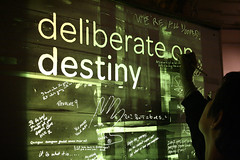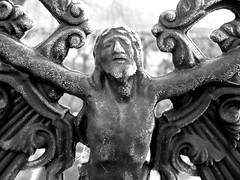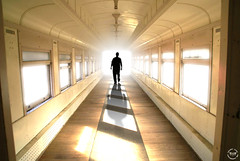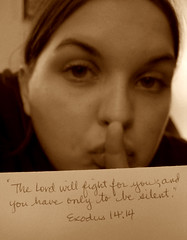Wednesday, 31 January 2007
Tuesday, 30 January 2007
Commitment - another view
This may sound like a stand-up routine, but Chapman was addressing a meeting of top designers in London last year and he was making a serious point. He is fascinated by our relationships we objects, and how these change or fail. "I like the term 'adulterous consumption'," he says. "Relating to our material possessions is parallel to tech idea of adultery, of making a commitment to one thing and then becoming quickly distracted by a younger model. It's so rare now that there's anything in life we are tied to forever. Everything is temporary is we want it to be." (from New Scientist, January 2007)
I've just been involved in a few "cases" of marriage relationship issues and the notion of 'not being tied to anything/anyone forever' and/or 'Everything is temporary if we want it to be' seems to be the "story" that is coming through.
Are our relationships with each other, even marriage, being more & more viewed in this regard? Do 'celebrity' marriages give support to this way of thinking?
"Easter just might, after all, be true"
| by William H. Willimon |
| In a lecture on "The Renewal of the Inner City Church," Jim Wallis told a group of pastors true stories of declining inner-city churches that had, by the grace of God, rediscovered their mission and begun to thrive. I was inspired, but in the conversation afterwards one pastor after another criticized Wallis's speech. They accused him of looking at the church through rose-colored glasses. One even implied that he had lied. That evening I told Wallis that I was appalled by the group's reaction. "I wasn't," he said. "That's the reaction I always get from mainline, liberal pastors. They are amazed when God wins. Scared to death that Easter just might, after all, be true." |
Saying "Yes" and "No"
Monday, 29 January 2007
No title - just a quote that bothers
“But for the present age, which prefers the sign to the thing signified, the copy to the original, representation to reality, appearance to essence . . . truth is considered profane, and only illusion is sacred. Sacredness is in fact held to be enhanced in proportion as truth decreases and illusion increases, so that the highest degree of illusion comes to be the highest degree of sacredness.”
—Feuerbach, Preface to the second edition
of The Essence of Christianity
Saturday, 27 January 2007
Found this on "Slow Leadership"
There seems to be an innate desire in many people to avoid change of any kind. Despite all the evidence that the future, just like the past, is comprised of equal parts of volatility, surprise, and unexpected reversals of fortune, we cling to the insane belief that this time things will be different. Our institutions, our ways of thinking, even our future plans, will somehow manage to remain stable. We mistake stubbornness (which refuses to budge) and complacency (which refuses to listen) for resilience (which means bending and shifting whenever the alternative is to break altogether).
Friday, 26 January 2007
Love this quote:
"A rhythm of life should be exactly that, a rhythm, not a full concerto with every instrument written up,but rather the background beat that keeps everything else in order, that calls things back on track when they deviate, that reminds us of the type of music we are wanting to play, or perhaps more accurately, what type of lifestyles we are wanting to lead."
Thursday, 25 January 2007
Think about it ...
—Frederick Buechner
Listening for God's call
Seeing the obvious at St. Andrew's
It seems that Sherlock Holmes and Dr. Watson went on a camping trip. They pitched their tent under the stars and then went to sleep. In the middle of the night Holmes awakened and exclaimed, “Watson, look up and tell me what you deduce.” Watson opened his eyes, and said, “I see billions and billions of stars. It’s likely that some of these stars have planetary systems. Furthermore, I deduce that there is probably oxygen on some of these planets, and it’s possible that life has developed on a few of them.” Is that what you see? Holmes replied, “No, you idiot. Somebody stole our tent!”
This humorous story brings to light an important idea, namely, the obvious can sometimes be difficult to see. Like Dr. Watson in the above story, we bring in our own agendas, biases, and filters.
I think most of us would agree that when we're solving problems or developing concepts, it's important to understand the "obvious" elements of those problems and concepts.
One strategy is to step back from the issue and ask oneself, "What are the most obvious things I can say about this issue?" Another is to ask, "What's my blind spot?"
Yet these approaches feel unsatisfactory. They work sometimes, but often I feel like I'm blathering on like Dr. Watson. That's because it's not always easy to be aware of my biases.
So here's my question : "How do we at St. Andrew's by the Sea Uniting Church Glenelg recognise our own biases, etc. that prevent us from both seeing & hearing new things. How do we NOT see the obvious of the problems & challenges before us? Are we so wedded to who and what we were, our own dislikes & likes, etc. that the "obvious" is lost to us. We may see the wonder of the stars in the heavens - but maybe someone has stolen the bloody tent!
Wednesday, 24 January 2007
A Loving Critique - Holy Rebellion
Prophetic religion warns against the ritualization of the relationship between God and his people. Prophets seek to remind the people of intensely personal nature of the covenant between God and his people. Martin Buber gives warning of the dangers the religious institutionalism when he notes that ”…centralization and codification, undertaken in the interests of religion, are a danger to the core of religion.” This is inevitably the case he says, unless there is a very vigorous life of faith embodied in the whole community, one that exerts an unrelenting pressure for renewal on the institution.’ It was C.S.Lewis who observed that “there exists in every church something that sooner or later works against the very purpose for which it came into existence. So we must strive very hard, by the grace of God to keep the church focused on the mission that Christ originally gave to it.”
A prophetically consistent Christianity means that we must remain committed to a constant critique of the structures and rituals we set up and maintain. Perhaps rather than calling this anti-institutionalism, a rather negative frame of mind, we should rather understand it as a form of ‘holy rebellion’ based on the loving critique of religious institution modeled by the original apostles and prophets—‘holy rebels’ who constantly attempted to throw off encumbering ideologies, structures, codes, and traditions that limited the freedom of God’s people and restricted the gospel message that they are mandated to pass on. This is prophetic religion in practice, and it remains one of the essential elements of a true experience of Christianity. It is rebellion because it refuses to submit to the status quo. But because it is a holy rebellion, it directs us towards a greater experience of God than what we currently have.
What I feel is needed at St Andrew's at the moment is just this expression of passion for witnessing to the Gospel on the part of the congregation and at the same time a loving willingness to critique who we've been and what we've done and are doing as the people of God in Glenelg. A deep love for God and our congregation AND challenging our congregational life in the light of Christ's gospel.
Tuesday, 23 January 2007
David Hicks Rally
What would Christ Jesus have us do? What is the appropriate response as Christians to this appalling situation?
Housing problems

Copied this from "Crikey". The housing shortage is beginning to hurt, especially the young, immigrants, etc. Have a couple from India in the congregation who are finding this to be so. As a church do we have something to say in this?
Change in the church
Ivan Illich was once asked what did he think the was the most radical way to change society; was it through violent revolution or gradual reform? He gave a careful answer. Neither. Rather, he suggested that if one wanted to change society, then one must tell an alternative story. Illich is right; we need to reframe our understandings though a different lens, an alternative story, if we wish to move beyond the captivity of the predominantly institutional paradigm which clearly dominates our current approach to leadership and church.
A paradigm, or systems story, is the set of core beliefs which result from the multiplicity of conversations and which maintains the unity of the culture. The ‘petals’ in this diagram are the manifestations of culture which result from the influence of the paradigm. Most change programs concentrate on the petals; that is, they try to effect change by looking at structures, systems and processes. Experience shows us that these initiatives usually have a limited success.
Monday, 22 January 2007
Wednesday, 17 January 2007
Trolling through flickr
So, enjoy reflecting on the photos!
Looking back down jetty at Glenelg
You know you see me
Tuesday, 16 January 2007
10 Theses for the Church
Some thinking from another "quarter".
- The fundamental crisis of the church today is a crisis of the Word of God. The church must recover the full dynamic of the Word, not just as Scripture, but as God-in-communication, especially through the written Word of Scripture and supremely through the Incarnate Word, Jesus Christ. This is another way of saying the church must recover a consciousness of who God is.
- Behaviors and structures in the church reflect fundamental concepts in the church’s self-understanding which often remain unarticulated.
- The church is essentially the community of God’s people, not primarily an organization, institution, program, or building. This is a distinction of fundamental importance because it is linked to the basic models of the church which Christians employ.
- The experience of salvation is incomplete and not fully biblical without genuine experience of the church as the community of God’s people and agent of the Kingdom.
- The most dynamic and prophetic thing the church can do is first of all to be a worshiping and serving community.
- Every believer is a minister, servant and priest of God. Every believer is called to ministry, and all God’s people must be equipped to minister.
- Every believer receives grace for ministry. Therefore spiritual gifts must be identified and employed to God’s glory.
- Leadership grows out of discipleship. Where careful discipling is lacking, leadership cannot be biblical and a crisis of spiritual leadership results. Worldly qualifications for leadership replace biblical ones.
- The church’s concern for and identification with the poor are sure signs of its faithfulness to the Kingdom and are often signs of fundamental renewal.
- In North America today a vital, biblically faithful church will be a countercultural community living in tension with the non-Christian elements of society and marked by a lifestyle that is distinctively Christ-like and Kingdom oriented.
Howard A. Snyder, Liberating the Church: The Ecology of Church and Kingdom (InterVarsity Press, 1983), 17-18.
When a gift moves in a circle
Anyway, borrowing from Jonny Baker (I know - again!)
From life experience we know that the simplest gift exchange is reciprocal giving. But gift exchange gets more interesting when it moves in a circle. When a gift moves in a circle no one receives from the person they give to. Lewis Hyde says this about it
That really requires some serious thinking!It's as if the gift goes around a corner before it comes back. I have to give blindly. and I will feel a sort of blind gratitude as well. The smaller a circle is - and particularly if it involves two people - the more a man can keep his eye on things and the more likely it is that he will start to think like a salesman. But so long as the gift passes out of sight it cannot be manipulated.
Monday, 15 January 2007
St Andrew's Glenelg looks to St Brendan?
Given our location, so close to the beach, there are some good images for us here at St. Andrew's to ponder. Taking inspiration from St Brendan who knelt on the beach before setting sail in his small leather boat and trusting the wind of God's spirit to blow him where the spirit willed, there is a challenge for us at St. Andrew's Glenelg to kneel before God and then set sail in mission. To bid farewell to the practices of the past that we hold on to because they are of the past and are well known and comforting to us, the known and fixed ways of doing things. To be on about leaving the comforts of the known and to trust ourselves afresh to God. Perhaps like St. Brendan we should make our mark in the sand NOW and sail off to where and what God calls us.
St Brendan's Prayer
Shall I abandon, O King of mysteries, the soft comforts of home? Shall I turn my back on my native land, and turn my face towards the sea?
Shall I put myself wholly at your mercy, without silver, without a horse, without fame, without honour? Shall I throw myself wholly upon You, without sword and shield, without food and drink, without a bed to lie on? Shall I say farewell to my beautiful land, placing myself under Your yoke?
Shall I pour out my heart to You, confessing my manifold sins and begging forgiveness, tears streaming down my cheeks? Shall I leave the prints of my knees on the sandy beach, a record of my final prayer in my native land?
Shall I then suffer every kind of wound that the sea can inflict? Shall I take my tiny boat across the wide sparkling ocean? O King of the Glorious Heaven, shall I go of my own choice upon the sea?
O Christ, will You help me on the wild waves?
Sunday, 14 January 2007
WISE BLINDNESS - from Jonny Baker's blog - again!
So, quoting from Jonny Baker's blog again as he writes ..
one of the terms i came across in the gift that i love is wise blindness. it is in a quotation hyde uses from rainer maria rilke. it's getting at the idea that when we create if we get too analytical we'll lose the giftedness of what we are doing. i guess the most obvious case of this is when a performer suddenly becomes self conscious and tongue tied in front of an audience. this actually applies in lots of areas of life - standing back and being analytical robs the moment of its magic. there's a great folk tale that hyde tells...
a brief entry in a mid nineteenth century collection of english fairy tales tells of a devonshire man to whom the fairies had given an inexhaustible barrel of ale. year after year the liquor ran freely . then one day the man's maid, curious to know the cause of this extraordinary power removed the cork from the bung hole and looked into the cask. it was full of cobwebs. when the spigot next was turned the ale ceased to flow.
in other words the gift is lost in self consciousness. this isn't to say that there isn't a place for analytical thought. but the creative moment isn't it. wise blindness also applies to the sense that poetry or a song or an idea comes to use from beyond ourselves, from god or whatever it is we believe is beyond us. best just to receive it as a gift. i actually think this is the best approach to the whole of life - life's a gift. the planet is a gift. friends are a gift. family are a gift. live out of gratitude. faithless say it better actually in the track i want more
...hills to climb sights to see seas to cross
friends to make hands to shake the world is yours
foods to taste sounds to hear love to feel
seeds to sow things to know fish to reel
space to quiz stones to lift
life's a gift...
Saturday, 13 January 2007
Exodus 14:14
Quoting from TobyMac: "Somebody shut me up so I can live out loud .."
I like that.
Interesting photo.
I wonder how we might approach that with the amount of talking, and so little silence, at our St. Andrew's Glenelg. Sometimes it appears that we talk so much we hardly ever hear each other.
From Kester's blog via Baker's blog - thanks guys.
As you might imagine it grabbed me! So just had to include it. The book referred to "The Gift" by Lewis Hyde I think I will have to 'get' even though I've lots of books I want & many still piling up to be read! Sometimes things just demand attention & effort.
For now it's reading, re-reading and thinking about what these two blogs, but Kester's on this occasion have presented.
http://kester.typepad.com/signs/2007/01/gift_economics.html
As some of you may know, I've been working on a novel for the past few months, playing with themes, among others, of the links between identity and consumption. One of the books I've picked up to feed the furnace has been Thorstein Veblen's 1899 satire Conspicuous Consumption (an excerpt from his longer work The Theory of the Leisure Class, available as part of the lovely Penguin 'Great Ideas' series), and I'm glad I did, as it's nudged me to re-thinking some of the ideas on gift within The Complex Christ. These are unrefined thoughts, but I wanted to set out a few posts on what I've mulled over.Firstly, an outline of Veblen's ideas.
His thesis begins with an examination of what he calls the 'leisure class' which 'is found in its best development at the higher stages of the barbarian culture; as, for instance, in feudal Europe or Japan. This leisure class is basically what we might now call the aristocracy, but his labeling is quite deliberate and, I think, rather contemporary. What obviously separates them - and Veblen gets us to think about this in more ancient cultures, rather than just in terms of stately homes etc. - is their employment:
'The upper (leisure) classes are by custom exempt from industrial occupations, and are reserved for certain employments to which a certain degree of honour attaches. Chief among the honourable employments in any feudal community is warfare; and priestly service is commonly second to warfare.'Actually, Veblen continues to list four main lines of activity for the leisure class: government, warfare, religious observance and sports. And, as World Cup fever truly grips (perhaps for only 4 more hours as England face Ecuador at 1600) it is interesting to note our continued fascination with the leisure class - we might call them celebrities now I suppose - who play for £120000 a week.
I want to explore the links Veblen identifies between warfare, consumption and leisure in another post. What interests me briefly here is whether Christian leadership is still seen as part of the 'leisure class' - a get out from real work, an escape of some sort.
Perhaps I'll do no more than present the question; what I would like to add is this fascinating quote from a letter a great friend and critic of Thomas Merton wrote to him. It talks of 'the monastic', but made me think on the insularity of some full-time Christian work:
"The point of being a Christian in the city is to try to humanize modern technology and modern society, and you [Merton] are trying to escape this. Let us admit that at the outset I am radically out of sympathy with the monastic project. […] All monasticism rests on a mistaken confusion of creation with this world, and so they suppose that by withdrawing in some symbolic fashion from creation they are leaving the world. But creation is precisely not the world, but its antithesis, and so what they do is essentially the opposite of salvation. They withdraw from creation into the desert taking ‘this world’ with them and then they dwell apart from creation, but in a newly erected kingdom of the prince of this world. You have not withdrawn from this world into heaven, you have withdrawn from creation into hell."
Rosemary Ruether writing to Merton. In Merton: A Biography, Monica Furlong, p 287
Friday, 12 January 2007
Thursday, 11 January 2007
A visitor's comments prompts thinking
Love the building, all that is inside, stained glass, architecture, smells & history, etc. But the kind of worship, programs, etc, that occur in them is not for them.
Our building is 'very' attractive as per comments above but I do wonder about our worship and our programs. Try as I/we might somehow or other it just doesn't seem to reach most people. The answer - change to attract - are we then selling out to get bums on pews? Be faithful to the 'received tradition' and only address & serve ourselves?
I've got to do some more thinking, but the thinking is beginning to hurt as I'm mostly talking to myself. Must find a 'conversation partner'.
Better by design: battling the throwaway culture
From New Scientist
04 January 2007 New Scientist
- Ed Douglas
- Magazine issue 2585
Jonathan Chapman is telling his audience why he took his hi-fi to a marriage guidance counsellor. It was the usual story: lack of communication. Chapman would come home from work and talk about his day, and the hi-fi would just sit there. Sometimes it would play music, but only if he told it to. Chapman doesn't know when it happened, but one morning he woke up and realised he no longer loved his stereo.
This may sound like a stand-up routine, but Chapman was addressing a meeting of top designers in London last year and he was making a serious point. He is fascinated by our relationships with objects, and how these change or fail. "I like the term 'adulterous consumption'," he says. "Relating to our material possessions is parallel to the idea of adultery, of making a commitment to one thing and then quickly becoming distracted by a younger ...
Wednesday, 10 January 2007
Johari Window
| Known to Self | Not Known to Self | |
| Known to Others |  |  |
| Not Known to Others |  |  |
1. The "open" quadrant represents things that both I know about myself, and that you know about me.
2. The "blind" quadrant represents things that you know about me, but that I am unaware of.
3. The "hidden" quadrant represents things that I know about myself, that you do not know.
4. The "unknown" quadrant represents things that neither I know about myself, nor you know about me.
Was doing some thinking about relationships in the Church Council. Could this provide some 'help'? Might need to find some elucidation?
Re last night's 20/20 cricket match
In broad terms, Debord's theories attempted to account for the spiritually debilitating modernisation of both the private and public spheres of everyday life by economic forces during the post-WW2 modernisation of Europe. He rejected as the twin faces of the same problem both capitalism of the West and the statism of the Eastern bloc. Alienation, Debord postulated, could be accounted for by the invasive forces of the 'spectacle' – the seductive nature of capitalism. Debord's analysis developed the notions of "reification" and "fetishism of the commodity"Karl Marx and Georg Lukács. This analysis probed the historical, economic and psychological roots of 'the media'. Central to this school of thought was the claim that alienation is more than an emotive description or an aspect of individual psychology: rather, it is a consequence of the mercantile form of social organization which has reached its climax in capitalism. (from Wikipedia on Guy Debord.)
More stuff sent to me to think about!
Beware the needs-meeting church!
There is a much quoted adage that ‘wherever there is a need there is the Salvation Army’. And there can be little doubt that this observation is intended to be complimentary, indicating a virtuous capacity for response. But is need-meeting all it’s cracked up to be? Or should we, as a Movement, as individuals, at times be a little more discerning?
Ann Morisy ("Journeying Out") in offering a ‘new approach to Christian mission’ certainly suggests so when she warns of ‘the distraction of a needs-meeting perspective’.
According to Morisy ‘when a church or a project gets caught up in a needs-meeting perspective it puts the Church and the congregation in a position of superiority. Those ‘out there’ are the ones in need, whilst those within the Church have the capacity to help’.
While this may well be a limited caricature, it is undoubtedly true that needs-meeting as an aim must imply that those who are needy are in some way deficit, whilst competence and resourcefulness are retained in the hands of the helper. Of course the Gospel with its propensity to invert everyday assumptions will have none of this – and neither should we. Rather we should seek to imitate Jesus’ own example and up-end the taken-for-granted pattern of giving and receiving.
As Ann Morisy herself warns, 'unless we can free ourselves from the liberal mantra of needs meeting, we may miss the real blessings and gracefulness associated with journeying out – without the expectation of being able to meet people’s need’.
Tuesday, 9 January 2007
Monday, 8 January 2007
Mark's busy thinking again
As before I think his reflections are worthy of posting - for comment!
Hi BruceI'm looking forward to Wed night on "decadence". But in the mean time, here's a couple of thoughts:1. We've swapped our human idols - probably until the beginning of the 20th Century the humans that were considered to be "idols" were philosophers, politicians, artists (writers, painters, ... broad definition here), scientists etc. Today - our idols are from holiday: the faces on the screen as opposed to those that had the brains (? may be an overstatement about some of the material that comes out of there) who wrote it etc. Scientists and philosophers, etc ... perhaps not an endangered species, but not welcome much. We also have sports people - I'll lump those in with the faces on the screen, because once these people didn't get paid as much and while today's sports people are undoubtedly talented, some lack the breadth of things that made the oldies good (let's put in their humility etc). So we have a group of entertainers. Now to be a successful entertainer we have decided to pay you too much - result all sorts of problems: drugs, multiple highly public failed relationsihps, etc etc ... gets me on the front cover. Also - being on the front cover makes my value go up. BTW - I want all the things in their life - cars, clothers, houses, etc. (I wonder if the non entertainment companies decided to manufacture "stars" or "entertainers" or whether the "star production outfits" realised there was money to be had (from advertising) and created them - probably the latter. Thus - huxley's 1984 has come true - whatever the substance was that kept the masses happy - we have it: entertainers and no brain required. The outcome is a perceived need for their life style (which is manufactured by ...) (sadly even the universities have succumbed to this ... honourary doctorates for people who declare they don't read or worse still have never read an entire book - give those people AOs for services to sport or entertainment, but not phds!).2. Another school of thought: Louis 14 - liberalist until married a certain person. Result - conversative behaviour. Development of fairy tales - warned about consequences of certain behaviour. Now - fairy tales are politically correct - no-one dies, and certainly the message has been watered down ... we revert to life b4 Loius 14 got conservative. Does the demise of the fairy tale content say something about our society?? (this was a summary of someone's thoughts - they want to do a phd on fairy tales and morals).bet you glad you get emails like this... :-)
The following came to me from ...
Edward de Bono, no theologian, but definitely the leading specialist in creative learning processes, remarks that if there is a known and successful cure for an illness, patients generally prefer the doctor to use the known cure rather than seek to design a better one. Yet there may be much better cures to be found. He rightly asks how are we ever to find a better cure if at each critical moment we always opt for the traditional treatment? Think about this in relation to our usual ways of solving our problems. Do we not constantly default to previous patterns and ways of tackling issues of theology, spirituality, and church? To quote another Bono, this time from the band U2; seems like we are “…stuck in a moment and (we) can’t get out of it.” It is little wonder that our pre-commitments to the Christendom mode of church and thinking restricts us to past successes and gives us no real solutions for the future. We always seem to default to its preconceived answers. Genuine learning and development is at best a risky process but without journey and risk there can be no progress.
Saturday, 6 January 2007
Wedding
Friday, 5 January 2007
Counter Culture & Decadence
More thoughts to come.
Once again!
Anyway, I'm starting again. So here goes.


























